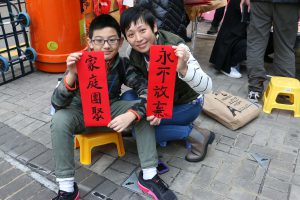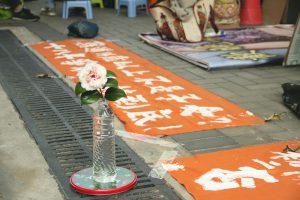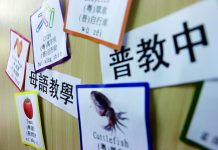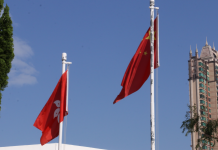Ada Fu, now 47, is a veteran of the fight for abode rights who took part in numerous protests, marches and hunger-strikes. Her grandparents have long resided in Hong Kong, and her father joined them in 1982 when Fu was 12. Eight years later, her mother left for Hong Kong as well, but according to the law of the People’s Republic of China, she could only take one child with her, so she took her 15 year-old son. Fu was left behind.
She came to Hong Kong on a one-week travel visa in 1999 after the Court of Final Appeal ruling and thought it would not take long to apply for and get residency rights. She recalls that during the first week of her stay, the government did not contact her but after a week, the Immigration Department asked her to register, which she did. She says she did not realise she had broken the law and could be arrested for overstaying.
“The government wasn’t preparing IDs for us, they were collecting our information to deport us,” Fu says. “They played us.”

Fu was repatriated on July 13, 2002 and did not gain residency until 2010, on the basis of her marriage to a Hong Kong permanent resident.
Ironically, in 2011, the government implemented an Overage Children Policy under which Fu would have been eligible to apply for a one-way permit to join her family in Hong Kong. The policy benefits eligible children who were under 14 when one of their parents became a permanent Hong Kong resident before 2001. Fu says she would rather apply for abode through this channel.
“[To get abode] sooner or later doesn’t matter to me, but [getting your rights through] lining up in the queue of family reunion is more meaningful,” says Fu. “Hong Kong is my home, but it is a home with a wall forbidding me to enter. It is hard to climb over it.”
Like Fu, Yu Xiaoqing, now 44 came to Hong Kong in 1999. She went back to the Mainland in 2003 and applied for a travel visa every three months to care for her disabled mother in Hong Kong. Yu eventually applied for right of abode under the Overage Children Policy and became a Hong Kong resident in 2012.
When Varsity met her in January, she was taking part in a sit-down protest for those abode-seekers who are left out of the scheme. Although she already has residency, she still cares about the abode seekers who are still struggling. Every time there is a campaign or protest, she shows up and supports them.

Yu says she has a great sense of belonging to Hong Kong and regards the city as her home. “In my whole life, living in Hong Kong is the best because here people can strive for what they want,” she says. “As a Hong Kong resident and as a part of society, I should care about social justice. It is also a fight for me. I hope everyone can be protected by law and enjoy equal rights.”
Yu thinks Hong Kong people have become less compassionate over the course of the past two decades and the relationship between the Mainland and Hong Kong has become strained and fractious. And for this, she believes the government is to blame for its divisive policies and strategies.
Jackie Hung, 47, a project officer of the Justice and Peace Commission of the Hong Kong Catholic Diocese, agrees with Yu and sees the separated families as victims of government policy. As for the abode saga, Hung accuses the then Secretary for Security Regina Ip Lau Suk-yee for “creating divisions in society out of malice”.
In April 1999, after the Court of Final Appeal’s ruling and leading up to the NPCSC interpretation, Ip’s bureau released statistics predicting that 1.67 million children would have abode rights and rush into Hong Kong in 10 years as a result of the ruling. The government said this would cost taxpayers HK$70 billion and the government would have to find 6,000 hectares of land to house them.
Hung recalls that government officials from different departments would speak in the Legislative Council every day, warning about how this huge influx of immigrants would “flood” the education system, the housing market and healthcare resources. For Hung, the projections were exaggerated and the “1.67 million … a ridiculous downright lie”.
However the warnings did feed into public anxiety and fear which was played up in the media before the interpretation request was made.
“We were using the ‘tyranny of the majority’ to overturn the rights of the minority. This is not the spirit of democracy,” Hung says.
To a certain extent, the alarmist rhetoric over the abode seekers has had a lasting impact on how new immigrants from the Mainland are still perceived today.













































